Live on the homepage now!
Reader Supported News
These unaccountable bodies hold increasing sway over US government. Their abuses of power affect us all
The common thread is the growing influence of these three power centers over our lives, even as they become less accountable to us. As such, they present a fundamental challenge to democracy.
Start with the supreme court. What’s the underlying issue?
Don’t for a moment believe the supreme court bases its decisions on neutral, objective criteria. I’ve argued before it and seen up close that justices have particular and differing ideas about what’s good for the country. So it matters who they are and how they got there.
A majority of the nine justices – all appointed for life – were put there by George W Bush and Donald Trump, presidents who lost the popular vote. Three were installed by Trump, a president who instigated a coup. Yet they are about to revolutionize American life in ways most Americans don’t want.
This new court seems ready to overrule Roe v Wade, the 1973 ruling that anchored reproductive rights in the 14th amendment; declare a 108-year-old New York law against carrying firearms unconstitutional; and strip federal bodies such as the Environmental Protection Agency of the power to regulate private business. And much more.
Only 40% of the public approves of the court’s performance, a new low. If the justices rule in ways anticipated, that number will drop further. If so, expect renewed efforts to expand the court and limit the terms of its members.
What about the Fed?
Behind the recent stories about whether the Fed should act to tame inflation is the reality that its power to set short-term interest rates and regulate the financial sector is virtually unchecked. And here too there are no neutral, objective criteria. Some believe the Fed’s priority should be fighting inflation. Others believe it should be full employment. So like the supreme court, it matters who runs it.
Presidents appoint Fed chairs for four-year terms but tend to stick with them longer for fear of rattling Wall Street, which wants stability and fat profits. (Alan Greenspan, a Reagan appointee, lasted almost 20 years, surviving two Bushes and Bill Clinton, who didn’t dare remove him).
The term of Jerome Powell, the current Fed chair, who was appointed by Trump, is up in February. Biden will probably renominate him to appease the Street, although it’s not a sure thing. Powell has kept interest rates near zero, which is appropriate for an economy still suffering the ravages of the pandemic.
But Powell has also allowed the Street to resume several old risky practices, prompting the Massachusetts Democratic senator Elizabeth Warren to tell him at a recent hearing that “renominating you means gambling that, for the next five years, a Republican majority at the Federal Reserve, with a Republican chair who has regularly voted to deregulate Wall Street, won’t drive this economy over a financial cliff again.”
Finally, what’s behind the controversy over Facebook?
Facebook and three other hi-tech behemoths (Amazon, Google and Apple) are taking on roles that once belonged to governments, from cybersecurity to exploring outer space, yet they too are unaccountable.
Their decisions about which demagogues are allowed to communicate with the public and what lies they are allowed to spew have profound consequences for whether democracy or authoritarianism prevails. In January, Mark Zuckerberg apparently deferred to Nick Clegg, former British deputy prime minister, now vice-president of Facebook, on whether to allow Trump back on the platform.
Worst of all, they’re sowing hate. As Frances Haugen, a former data scientist at Facebook, revealed this week, Facebook’s algorithm is designed to choose content that will make users angry, because anger generates the most engagement – and user engagement turns into ad dollars. The same is likely true of the algorithms used by Google, Amazon and Apple. Such anger has been ricocheting through our society, generating resentment and division.
Yet these firms have so much power that the government has no idea how to control them. How many times do you think Facebook executives testified before Congress in the last four years? Answer: 30. How many laws has Congress enacted to constrain Facebook during that time? Answer: zero.
Nor are they accountable to the market. They now make the market. They’re not even accountable to themselves. Facebook’s oversight board has become a bad joke.
These three power centers – the supreme court, the Fed and the biggest tech firms – have huge and increasing effects on our lives, yet they are less and less answerable to us.
Beware. Democracy depends on accountability. Accountability provides checks on power. If abuses of power go unchallenged, those who wield it will only consolidate their power further. It’s a vicious cycle that erodes faith in democracy itself.
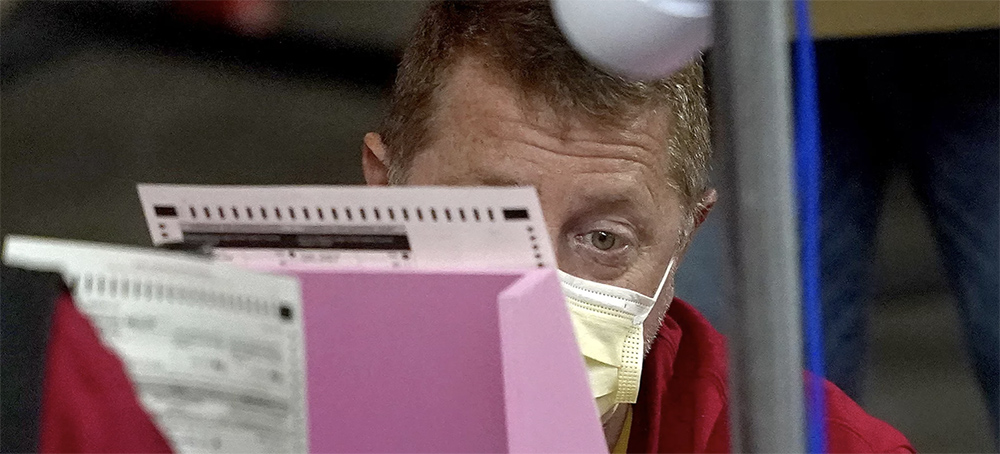 Maricopa County, Ariz., ballots cast in the 2020 general election are examined in May. (photo: Matt York/Pool/AP)
Maricopa County, Ariz., ballots cast in the 2020 general election are examined in May. (photo: Matt York/Pool/AP)
The point of the so-called audits is not so much to delegitimize the past election as it is to normalize unnecessary reviews of future ones—including, perhaps, a 2024 race in which Trump’s name may be on the ballot.
Late last month, forty-six weeks after voting in the 2020 Presidential election had concluded, Republicans in the Arizona State Senate unveiled the results of a so-called audit of more than two million ballots cast in Maricopa County. The recount, which they had commissioned from the Florida-based firm Cyber Ninjas, determined that President Joe Biden had not only won the county but had done so by three hundred and sixty more votes than was previously known. Both Democratic and Republican officials in Maricopa County had denounced the recount, fearing that it would be used to cast further doubt on the most thoroughly scrutinized and legitimate election in recent history. (The county’s vote alone had been verified several times.) Fuelling their concern was the fact that Cyber Ninjas had never conducted an election audit, and that it is led by Doug Logan, who openly promoted allegations of voter fraud. Those officials are no doubt relieved by the outcome. But, as was to be expected, Donald Trump, for whom all facts are relative, rejected the findings. He told a crowd at a Save America rally in Georgia, “We won on the Arizona forensic audit yesterday at a level that you wouldn’t believe.”
A more subtle mind than Trump’s would see the futility of having a questionable firm undertake an unnecessary recount only to offer findings that are counter to his immediate interests. But the point of the exercise, and of others like it taking place across the country, is not so much to delegitimize the past election as it is to normalize specious reviews of future ones—including, perhaps, a 2024 race in which Trump’s name is on the ballot. We have seen too much of this form of mainstreaming of the absurd in recent years to note every example, but its origins likely lie in Trump’s fixation on Barack Obama’s birth certificate. In that case, once the birther myths were finally dispelled, Trump pivoted to congratulating himself for forcing people to get to the bottom of the issue. In effect, he recast a conspiracy theory as a legitimate inquiry resolved by legitimate means. The danger is the probability that some illegitimate future inquiry will be used to achieve illegitimate ends. The groundwork for this is more advanced than we care to contemplate.
Trump’s defeat, by more than seven million votes, was taken to be a sign that the most anti-democratic forces he represented would also be vanquished. The failed January 6th insurrection, which he encouraged and which sent his own Vice-President scrambling to escape a mob threatening to lynch him, seemed a fitting epitaph for his Presidency, and for the malice and the chaos that it engendered. His own incompetence had proved a great asset to American democracy. Since his loss, however, more efficient actors have stepped up to do his bidding.
After Georgia’s Republican secretary of state, Brad Raffensperger, refused to throw the Georgia vote in Trump’s favor, the G.O.P.-controlled state legislature passed a bill diminishing the authority of his office, and giving itself greater control over the way elections are administered. The legislature now has the power to, among other things, challenge election officials. Bills that restrict voting access have been passed in at least seventeen other states this year. Meanwhile, Republicans in Wisconsin and in Pennsylvania have initiated investigations along the lines of the Arizona recount—representatives from both states paid visits to Maricopa County. (Similar efforts in Georgia and in Michigan resulted in no changes to the election outcomes.) Most bizarrely, the Texas secretary of state’s office announced that it will conduct a review of the 2020 results in Dallas, Harris, Tarrant, and Collin counties, even though Trump carried the state by more than six hundred thousand votes. Last week, county recounts in Idaho conducted after Mike Lindell, the MyPillow C.E.O., alleged fraud, found slightly fewer votes for Trump than were initially reported.
The 2000 Presidential election came down to disputed results in Florida, and was resolved by a Supreme Court ruling, in Bush v. Gore, whose partisan implications were regarded by many people as a judicial coup, but whose prescriptions were nonetheless adhered to by the Democrat who had won the popular vote but lost the Presidency. Now consider a scenario in which a Democrat wins the election, and Republican-controlled legislatures dispute the results in their states. The dangers are obvious and, given the precedent of January 6th, include the potential for violence. It’s not encouraging that one of the lessons of the Republican-led opposition to vaccine mandates and other public-health measures is that, in moments of crisis, not even the logic of self-preservation can be relied on. (Early in the pandemic, the lieutenant governor of Texas, Dan Patrick, said, in defiance of shutdowns, “There are more important things than living.”)
All this Trumpist fervor points to the importance of the Democrats in the House and the Senate taking full advantage of their control of those chambers. Countering voter-suppression efforts, more than twenty-five states have, in fact, passed bills expanding access to the ballot. These measures desperately need to be augmented by federal voting-rights legislation that is currently being held hostage by the debate over filibuster reform.
In an op-ed for the Washington Post, published in June, Senator Kyrsten Sinema, Democrat of Arizona, justified her support for the filibuster, saying that it forces legislative minorities and majorities to find compromises on legislation. But Senate Republicans have used it to prevent the For the People Act, which Sinema co-sponsored, from even coming to the floor for debate. Sinema’s own state is the clearest example of what is at stake. We may yet avert a full-fledged constitutional crisis, but, should one arrive, we can’t say we never saw it coming.
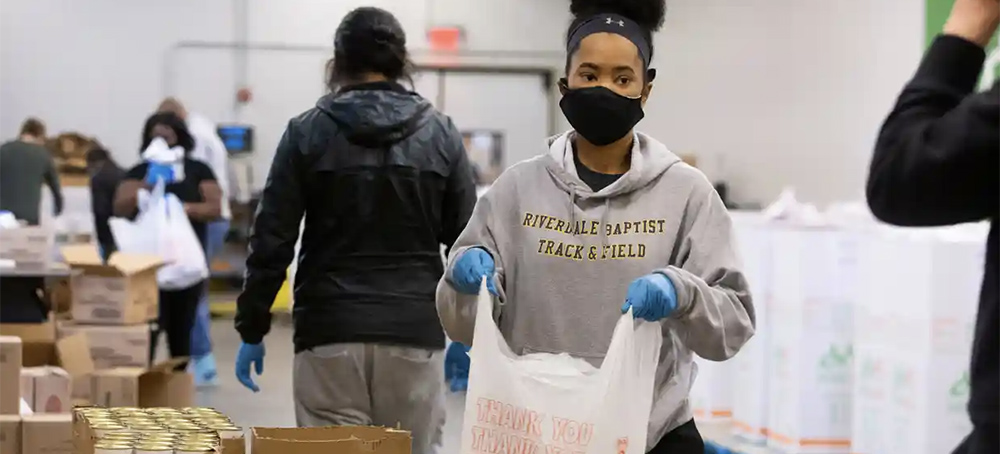 Volunteers prepare food items that will be donated to those in need at Capital Area Food Bank in Washington DC earlier this year. (photo: Michael Reynolds/EPA)
Volunteers prepare food items that will be donated to those in need at Capital Area Food Bank in Washington DC earlier this year. (photo: Michael Reynolds/EPA)
Households struggle to afford medical care and food, with figure rising to 59% for those with income under $50,000 a year
The survey by NPR, the Robert Wood Johnson Foundation and the Harvard TH Chan School of Public Health also showed that in those last few months, as the US struggled to contain the infectious Delta coronavirus variant, the percentage of households reporting serious financial problems rose to 59% when they had an income under $50,000 a year.
Among those lower-income households, 30% said they had lost all their savings during the coronavirus pandemic.
Reports of serious financial problems were not equal across racial and ethnic groups: 57% of Latinos, 56% of Black people and 50% of Native Americans said they had experienced serious financial problems in the past few months, compared with 29% of white people.
The problems were reported despite government assistance meant to lessen the financial burden of the Covid-19 pandemic. Of households surveyed, 67% said they had received financial assistance from the government in the past few months.
The survey of roughly 3,600 US adults was conducted between 2 August and 7 September. It also found that among households with children in kindergarten through high school, 69% said their children had fallen behind because of the pandemic.
In the past few months, 17% of households reported serious problems affording medical care, including 28% of households with annual incomes below $50,000.
Among Asian American households, 25% reported fear of being threatened or physically attacked because of their race or ethnicity. For Native American households that figure was 22%; it was 21% among Black households, 8% among Latino households and 7% among white households.
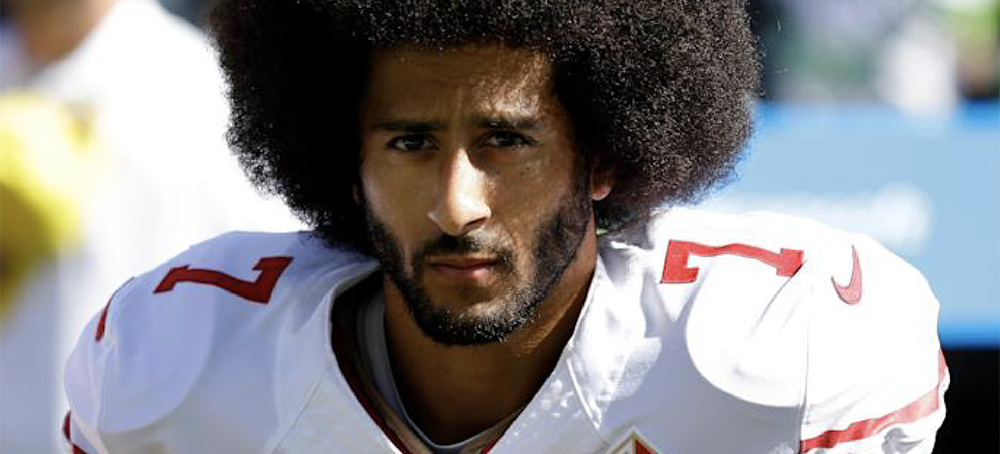 Colin Kaepernick. (photo: USA Today)
Colin Kaepernick. (photo: USA Today)
A group of Black football players are working out at a combine, a place where college players are measured and tested by NFL coaches and team executives. With Kaepernick narrating, the scene suddenly morphs from players working out, to those same players being in chains, and auctioned off as slaves.
And the coaches who were working the players out suddenly morph into slave auctioneers and owners.
There's no subtlety here. Kaepernick and co-creator Ava DuVernay are equating the combine process to the buying and selling of slaves. This will certainly cause some people's heads to explode like a bursting star.
But don't let the opening fool you. Because the series "Colin in Black and White" isn't shocking for the sake of shocking and it also morphs into something different as it unfolds, transforming from that stunning scene into a thoughtful coming of age story that examines race, class and culture in America.
It is one of the most unique stories told about race which makes sense since Kaepernick's journey itself is so unique.
And when Kaepernick critics hate watch the series, they will try to say it's self-indulgent. But this isn't what Kaepernick is doing. He's telling a story about race and class through a familiar lens which is his own life. This isn't self-indulgent, it's an American self-portrait.
The reemergence of Kaepernick is interesting for another reason. The leaking of emails from Raiders coach Jon Gruden that led to him quitting on Monday night demonstrate something Kaepernick has said repeatedly for years. Throughout his protests, and since, he spoke of systemic racism both in society and in the NFL. They were often intertwined. He's portrayed the league as an entity that at its core was racist.
What Gruden's emails show is the league's problem with race might be far more extensive than many knew. In effect, Kaepernick wasn't just right, he was incredibly right.
And now comes his series that examines race, just as the NFL will be again examining race, years after the league banished him for protesting over issues of race.
The series premiers on October 29 and stars an impressive Jaden Michael as the young Colin. It also features Kaepernick narrating parts of his own life, with scenes of him watching Michael portray him on the screen.
The Netflix series isn't the only thing Kaepernick is doing. Far from it. His publishing company, Kaepernick Publishing, launches a book this month called "Abolition for the People: The Movement for a Future without Policing & Prisons." He's the editor of a collection of 30 essays including one by longtime civil rights activist Angela Y. Davis. The voices in the book come from political prisoners, grassroots organizers, scholars and relatives of those killed by police.
The series and book are important not just for their content, but also for a larger, more vital fact about what Kaepernick is doing with these releases.
They represent the continuing evolution of Kaepernick. He's gone from a football player, to one of the great civil rights activists of our time, to where he is now, building a galaxy of Black-themed content post exile from the NFL.
Critics of Kaepernick will say he's creating an Empire of Wokeness. In actuality, he's forging an Empire of Blackness.
Some people won't like the fact that Kaepernick is creating this empire, or will deny it, or will even lie about his intentions or accomplishments. But this is the truth: He is doing things that benefit Black and brown people in a way few, if any, other American athletes have ever done.
In the Netflix series, Kaepernick isn't just telling his story, he's serving as an avatar for what it's like for some Blacks growing up in America.
The fact that Kaepernick is biracial is irrelevant. In his life, to some of the whites he encounters as he grows up, whether it's in a hotel lobby or pool, where he suffered discrimination, or on a highway stopped by a police officer who nearly draws his gun on a teenage Kaepernick as he reached for his identification, he is a Black man. A threat. Period and full stop.
Or even as a young quarterback, where he was discriminated against by coaches who preferred white quarterbacks to him despite them not being as talented as he is, Kaepernick's Blackness is seen as a form of inadequacy.
In this way the series expands beyond Kaepernick and is a metaphor for the Black experience. The fact he's adopted, and has white parents, is also irrelevant. To the outside world he's a Black man and is often treated accordingly.
With the Netflix series and the book Kaepernick continues on his quest to generate Black-themed content, both pushing back against the false narratives about him, including that he wasted the momentum of the peaceful protest movement, and giving people of color a say in a media that often ignores them.
Kaepernick founded the Know Your Rights Camp to teach kids their legal rights and self-empowerment. He started a relief fund during the pandemic and he's donated millions to numerous campaigns. He created a publishing company, an SPAC that’s raising several hundred million dollars for social justice initiatives, and a production company.
In the Netflix show the star is of course Michael, who plays young Kaepernick with wide-eyed naivete and emotion. (The final scene where Kaepernick writes a letter to his younger self had me sobbing like a baby.)
The series is important but it's more than a story about Kaepernick. It's about something far bigger. It represents another evolution of Kaepernick as he builds his empire of Blackness.
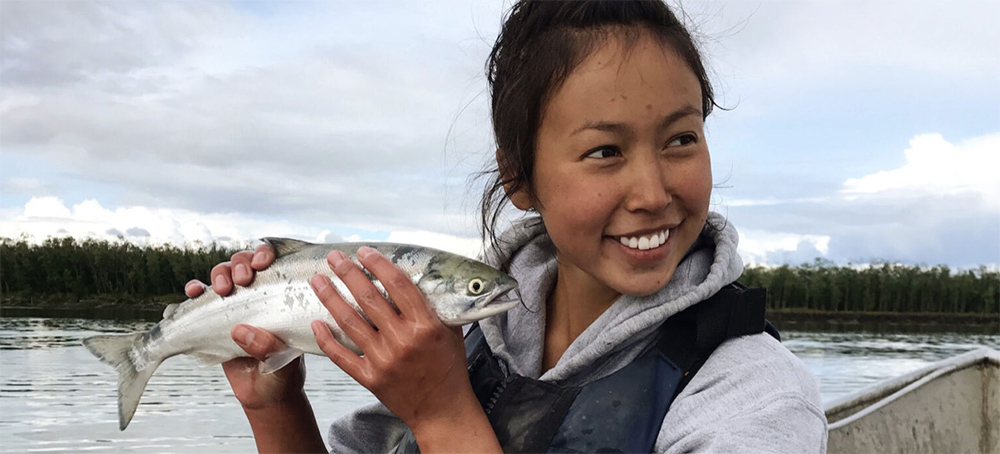 Elizabeth Mik' Lindley is one of the students in UAF's Tamamta program, which brings together Indigenous and Western sciences to transform graduate education and research in fisheries and marine sciences. (photo: Elizabeth Mik' Lindley)
Elizabeth Mik' Lindley is one of the students in UAF's Tamamta program, which brings together Indigenous and Western sciences to transform graduate education and research in fisheries and marine sciences. (photo: Elizabeth Mik' Lindley)
It’s called Tamamta, a Yup’ik and Sugpiaq word that means “all of us” or “we”, and it’s part of UAF’s College of Fisheries and Ocean Sciences.
Fisheries professor Courtney Carothers is the faculty member in charge. She says the nine Indigenous graduate students starting their fellowships this year are from all over Alaska, but they’re united by a common goal.
The following transcript has been lightly edited for clarity.
Courtney Carothers: The clear message coming out of a lot of different projects was that there’s this sense that the kind of persistent deep inequities that Alaska Native people are facing in fisheries, education, research, governance systems is pronounced.
There’s this real lack of Indigenous people, Indigenous values, Indigenous knowledge systems included in how we teach and research and govern fisheries in Alaska. And we feel like that’s a real gap and problem. And so we can sort of do our fisheries and marine work in a different way, really trying to elevate Indigenous knowledge systems that are in Alaska — 14,000-plus years deep, to really be used alongside Western science in these systems.
Casey Grove: There really is a lot of knowledge there. What does it mean to include Indigenous knowledge and science? What does that look like?
CC: We really try to advocate against including Indigenous knowledge in Western science and more moving to recognize that Western science is its own knowledge system — it’s a knowledge system, kind of with European worldview and values, norms, assumptions. And recognizing that Indigenous knowledge systems are diverse, but equally valid and they’re based on different worldviews and values and norms and assumptions. So they’re distinct. And so we really try to elevate and recognize Indigenous knowledge systems as their own intact knowledge systems. They don’t need to be validated with Western science. I think sometimes in Western education and resource governance and management, Western science is thought of as the only system or that it’s universal — that everyone shares the same worldview and ways of thinking. And, of course, in Alaska, that’s not true. And we think it’s for the betterment of all to use multiple ways of knowing in our research and in our education and in our governance systems.
CG: If we were talking about a research paper or a project, what specifically, if there was an example, would be different?
CC: So I think some of the really core features in many Indigenous knowledge systems are core values around respect and reciprocity, relationships and even really fundamental assumptions. You know, in the case of fisheries, in the Western worldview, fish are a resource, right? They’re a natural resource. We think about them to make money or maybe for food.
But in the Indigenous worldview, fish are non-human kin. They’re a relation. They’re a being with as much agency, with as much intentionality as people. And so they deserve respect in the same way that people do.
And so, if research was done from an Indigenous knowledge system with regard to fish it would be really different by design than a Western project that might think about counting fish, extrapolating the returns of fish. In an Indigenous context, the whole nature of what we’re studying, how we study it, why we’re studying it, might look really different. And so it’s hard to bring those two knowledge systems based on really different understandings of the world together, but it’s being done in really unique and interesting ways.
CG: The students are all graduate students, but they’re from all different parts of the state. I wonder, could you tell me about two or three of them?
CC: Yeah, most of the fellows in our cohort are first-year graduate students this year, like you said, from all over the state.
Tazia Wagner, is Ts’msyen, Lingít, Haida and Athabascan student based in Metlakatla. And so she just graduated with her BA in fisheries from UAF in the spring. She works at the Department of Fish and Wildlife for the Metlakatla Indian Community and they run the largest tribal fishery in the nation. And seeing her work evolve, you know, she’s really wanting to get trained in Western fishery science, but also recognizing such a depth of knowledge from her elders and her family and community in Metlakatla and the way they are able to manage their tribal fishery and trying to really study some of the the ways in which the Western management at the state level and the federal level has negatively impacted Alaska Native communities. So the limited-entry program is one topic that she’ll be exploring and how that program which, again, has Western assumptions built into it, that fishing is individual, that the right to it should be commodified, that you should purchase a permit to have access — these are values that don’t align well in Alaska Native communities. And so she’s studying the impact of that program on her community and the fishermen from her village and throughout Southeast Alaska.
And then we have a few students who are further along in their studies. Elizabeth Mik’aq Lindley is a Yup’ik student who was born and raised along the Kuskokwim River in Bethel. She’s starting her second year of her master’s in fisheries. And, you know, hearing her speak about her deep cultural ties to salmon and Yup’ik ways of knowing and being really brought her to be studying salmon and fisheries and having these reflections, you know, that Western fishery science in her undergraduate degree didn’t necessarily have much recognition for Yup’ik ways of understanding, Indigenous ways of understanding fishery systems. And so in her master’s work, she’s studying salmon in the Arctic and trying to bridge some of the Western, more recent observations of salmon and environmental change with longer-term, Indigenous understandings of salmon and other species and long-term environmental shifts in the Arctic.
So, that’s just a couple. There’s nine fellows, all with amazing biographies on our website. I really hope folks check out the fellows page. They’re just already doing amazing work. And I’m sure they’ll be doing much more as they progress through their careers and education.
CG: Does it feel like this is a very long-term project, that you’re sort of slowly trying to turn the ship in a way?
CC: I think that is a good analogy. And that’s been our sense that this is kind of long-term work. But I will say, having this first cohort start, nine Indigenous students pursuing their master’s and PhDs in fisheries, marine sciences, Indigenous studies feels like a big shift. And it’s shocking in 2021 that that’s the case in Alaska. But it is. And to have this powerful cohort of Indigenous students, again, already doing amazing work, they’re leaders in their communities, they’re leaders in our classes, and looking forward to having their credentials and degrees and to really be doing this kind of work in a different way, in an Indigenous way, it’s really transformative. And it brings a lot of hope, and deep love and hope for the future for those of us that have been trying to work on some of these issues for a long time. And many of us before. You know, this work is also standing on the shoulders of many others who’ve been trying to promote similar changes for decades and longer.
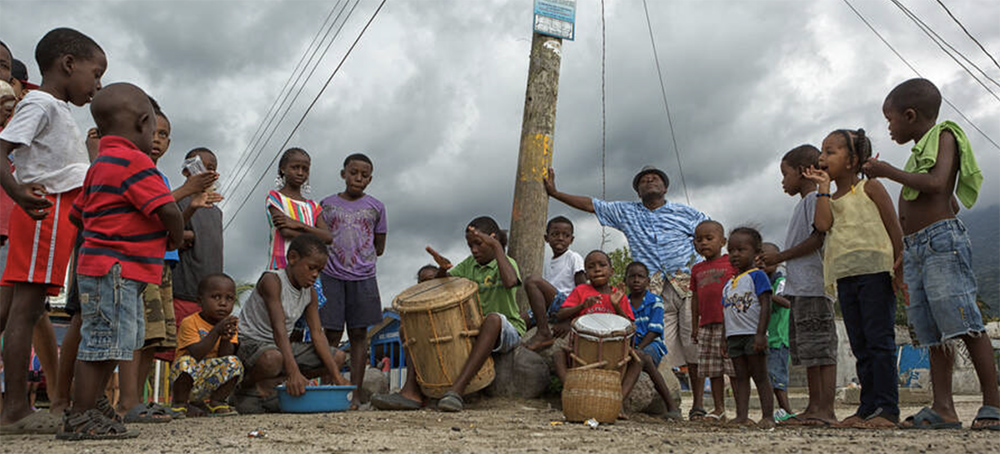 Young Garifuna boys play traditional drums in Sambo Creek, Honduras. (photo: Shutterstock)
Young Garifuna boys play traditional drums in Sambo Creek, Honduras. (photo: Shutterstock)
Many would-be migrants, like the Garifuna, would love nothing more than to stay in our homes. It’s Washington that’s making it difficult.
Latin American and Caribbean communities like ours are rarely noticed in U.S. media — except when we migrate.
In summer 2021, U.S. Vice President Kamala Harris came to Central America and told would-be migrants: “Do not come.” More recently, photos of U.S. Border Patrol agents whipping Haitian refugees in the Texas desert brutally drove that message home.
This anti-migrant message is dehumanizing and wrong. But the truth is, many of us would love nothing more than to stay in our homes. It’s Washington that’s making it difficult.
The Garifuna are being forcibly displaced from our beautiful traditional lands along the Caribbean coast of Honduras.
Our livelihoods are threatened by the expansion of the global tourist industry, African palm plantations, so-called “Special Economic Development and Employment Zones” (also called Model Cities), and drug cartels that run cocaine through our territories, destined for U.S. markets.
We’re also under threat from gated retirement communities with U.S. and Canadian financing, as well as mining and hydroelectric projects, including projects with development bank financing.
I’m part of a group called the Black Fraternal Organization of Honduras (OFRANEH, by its initials in Spanish), a federation representing the Garifuna peoples of Honduras. From our perspective, our communities are being emptied of people to benefit the Honduran elite and investors from the U.S. and other rich countries.
When we resist dispossession and refuse to leave our lands, we are threatened, forcibly disappeared, or murdered — threats made all the more dangerous by the security assistance the corrupt Honduran state receives from Washington.
In the last few years, we have counted 50 assassinations of Garífuna people and dozens of cases of legal persecution. Meanwhile our young people are abandoning their communities in droves as a result of the violence, persecution, and lack of healthy living conditions.
OFRANEH has been fighting to reclaim the Garífuna people’s ancestral territory and to improve these conditions through cultural resurgence and traditional agricultural practices.
Through the Inter-American Court of Human Rights, we have won important cases that order Honduran authorities to recognize our traditional lands and guarantee our use and enjoyment of our territory. But the Honduran government refuses to implement these decisions.
Instead, since winning these cases, we’ve faced increasing threats, criminalization, displacement, and assassinations.
In July 2020, four Garifuna youth from Triunfo de la Cruz were abducted at gunpoint by men wearing uniforms with the logo of the Honduran Investigative Police (DPI) — an entity that has received U.S. training. The four men haven’t been seen since. One of them was the president of the town council and a vocal defender of Garífuna land rights.
In a country where such crimes usually go uninvestigated, OFRANEH is taking action. A few months ago, we launched the Garifuna Investigation and Search Committee for the Disappeared of Triunfo de la Cruz. Its initials, SUNLA, mean “Enough!” in our language.
Through SUNLA, we are pushing to return the four youth to their community alive, to protect their families and witnesses, and fight for truth and justice for this crime. So far, the state is not investigating seriously. Instead, officials are blaming the four for their own disappearance, accusing them of being criminals.
Since the 2009 coup, human rights and Indigenous land defenders have been routinely murdered in Honduras — even high-profile figures like Berta Cáceres. Yet U.S. support for the Honduran state has continued. Whether we migrate or fight to stay on our lands, we face tremendous threats.
For this reason, we’re calling for international solidarity to halt the persecution of the Garífuna people and for SUNLA’s incorporation into the investigation into these forced disappearances, as well as for respect for our traditional lands and our self-determination. This genocidal plan to exterminate our people must be halted.
We’re also calling for the United States to halt its support and security assistance to the Honduran regime, which could be done by passing the Berta Cáceres Act and the Honduran Human Rights and Anti-Corruption Act.
On this Indigenous People’s Day, we condemn the assault on Indigenous peoples throughout our hemisphere — as well as the brutal mistreatment of migrants seeking safety and opportunity.
OFRANEH and the Garifuna will continue our fight to live and prosper in Honduras. As for the politicians who would tell us “do not come,” we call on them to stop backing the regimes that would displace us.
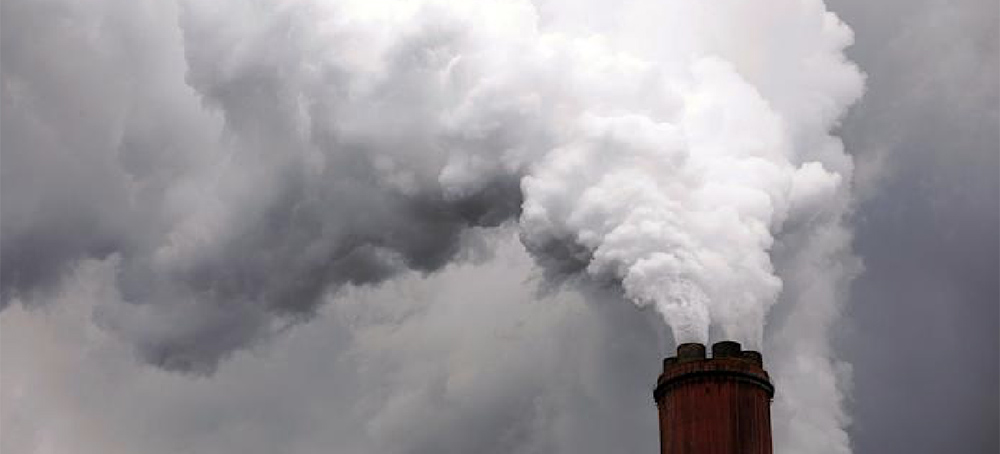 Toxic vapor pours from a chimney at a power plant in Belchatow, Poland. (photo: Piotr Malecki/Bloomberg/Getty Images)
Toxic vapor pours from a chimney at a power plant in Belchatow, Poland. (photo: Piotr Malecki/Bloomberg/Getty Images)
"Climate positive" companies say they want climate action. Their lobbying activity often says otherwise.
Despite ambitious commitments to reduce their greenhouse gas emissions, a new report from the nonprofit ClimateVoice reveals that 12 of the U.S.’s largest pro-climate companies are obstructing efforts to pass the Build Back Better Act — the multitrillion-dollar budget reconciliation package that would help set the nation on track to meet the Paris Agreement goal of limiting global warming to 1.5 degrees Celsius (2.7 degrees Fahrenheit).
The White House and progressive senators say the Build Back Better Act is the nation’s best chance of mitigating future climate change-related suffering and costs, which promise to be astronomically higher than the upfront cost of reducing emissions now. But the bill, which contains funding for various green initiatives, tax credits for clean energy, and a program that would slash roughly 80 percent of the emissions from the electricity sector by the end of this decade, is on the rocks. Democrats can’t decide amongst themselves how much to spend on the package or even exactly which programs should be included in it. If the climate portion gets declawed or cut entirely, the left may not get another opportunity to pass climate policy for a very long time.
As this debate plays out, corporations including Coca-Cola, McDonald’s, Nike, and Pfizer are among those that are “missing the moment,” ClimateVoice’s report said.
The report, which was created in partnership with the think tank InfluenceMap, considered 20 of the largest “climate positive” U.S. companies — companies that have come out publicly with commitments to reduce their environmental impact, or that have supported climate-related policies in the past. ClimateVoice then judged the companies against three criteria to see if they were “leading” efforts to pass the Build Back Better Act: endorsing the act’s climate policies, supporting its revenue provisions to pay for those policies, and opposing lobbying from trade associations that would undermine the bill.
Not one of the companies met all three criteria, and 12 of them — including 3M, Cisco, and Tesla — met zero. Eight companies met just one or two criteria, lending “cautious” support for the Build Back Better Act but not putting their full weight behind it. These were Amazon, Apple, Exelon, Facebook, Microsoft, Netflix, Salesforce, and Walmart.
Bill Weihl, ClimateVoice’s founder, chastised the companies for prioritizing tax cuts and deregulation over the opportunity to support historic climate legislation. “This is our shot at national policy,” he said, yet most green-talking companies have remained silent on the bill. If companies don’t step up, Weihl added, “they are going to be held to account for years to come.”
One of the most common reasons for a low score was the corporations’ ties to lobbying groups and trade organizations that are fighting to block the reconciliation package. The U.S. Chamber of Commerce is among the groups that have vociferously opposed the bill, calling it an “everything but the kitchen sink collection of bad policies.” The Business Roundtable and National Association of Manufacturers have also been fighting it, with the former saying it has mounted a “significant, multifaceted campaign” to oppose the bill’s tax provisions.
Weihl accused the lobbying groups of disproportionately representing the interests of their fossil fuel industry members. “They’re trying to maintain the status quo for oil and gas,” he said.
Kendra Haven, U.S. program manager for InfluenceMap, noted that the lobbying groups’ positions were out of step with their members’ stances on climate policy. For example, previous analysis from InfluenceMap has suggested that, despite supporting some market-based mechanisms to address climate change, the Chamber of Commerce’s engagement with climate policy is much more closely aligned with a few of its fossil fuel industry members than with the vast majority of its other constituents.
“It raises questions about how their policy decisions are come to,” she said. “But without visibility for those inside processes, we can’t know.”
All but one of the companies included in ClimateVoice’s analysis, Tesla, maintain ties to one or more of the three lobbying groups highlighted in the report (the Chamber of Commerce, the Business Roundtable, and the National Association of Manufacturers). Five companies — 3M, Johnson & Johnson, Microsoft, PepsiCo, Pfizer, and Salesforce — are connected to all three, either as corporate members or through executives who serve on the lobbying groups’ boards.
The Chamber of Commerce, the Business Roundtable, and the National Association of Manufacturers didn’t respond to requests for comment from Grist.
Three of the 12 corporations that met zero of ClimateVoice’s criteria responded to Grist’s request for comment. 3M said that it supports the Paris Agreement and noted that it recently signed onto a statement in support of a clean electricity standard. Coca-Cola said that it “appreciated” policymakers’ efforts to address U.S. climate goals and that it remained committed to its own “science-based targets related to climate change.” PepsiCo sent links to its public policy engagement guidelines and its climate pledge, which includes achieving net-zero greenhouse gases by 2040. Cisco, Google, HP, Johnson & Johnson, McDonald’s, Nike, Pfizer, Qualcomm, and Tesla either did not respond to Grist’s request for comment or declined to comment.
Five of the eight corporations that received a “cautious” grade on ClimateVoice’s scorecard responded to Grist’s request for comment. Amazon confirmed to Grist that it supports a higher corporate tax rate to “pay for things like infrastructure.” A spokesperson for Exelon called the report’s findings “demonstrably false” and cited the company’s track record of lobbying for climate policy and its efforts to decarbonize its power supply. Facebook sent a link to a public statement expressing support for the climate provisions in the Build Back Better Act. Salesforce sent Grist a blog post confirming the company’s support for the bill’s climate policies and said the company is “willing to take the pay-fors related to the climate pieces” of the legislation. Walmart said it hasn’t taken a stance on any specific bill, and sent a LinkedIn post highlighting the company’s previous sustainability actions and calling for market-based emissions reduction policies. Apple, Microsoft, and Netflix declined to comment.
To fully support the reconciliation package and to give it a fighting chance at passing, Haven and others have called on the 20 companies named in the report to throw their full support behind the bill — both its climate and tax sections — and to rebuke the activity of their lobbying groups, either through public disavowals or by leaving the organizations altogether.
“It needs to be soon, it needs to be clear, and it needs to be strong,” Haven said, highlighting the high stakes surrounding the Build Back Better Act. “That would make them true leaders, and it could change the course of climate policy.”
Follow us on facebook and twitter!
PO Box 2043 / Citrus Heights, CA 95611

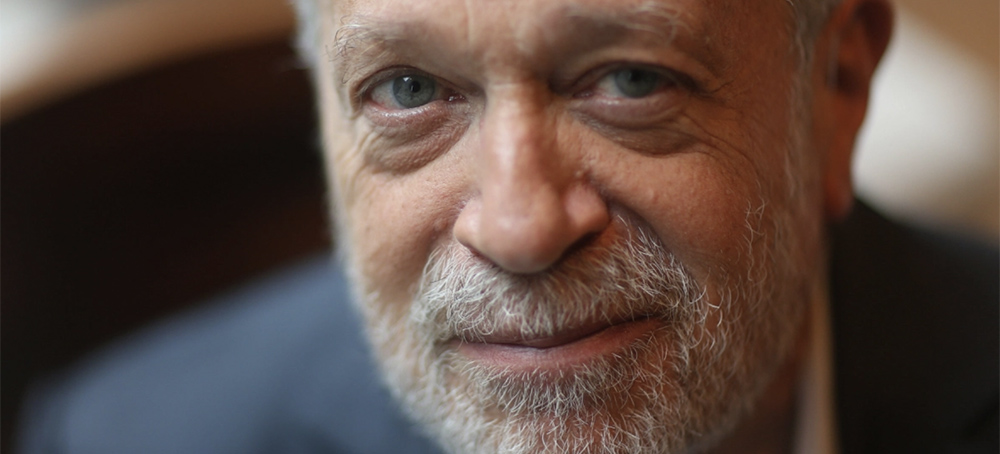

No comments:
Post a Comment